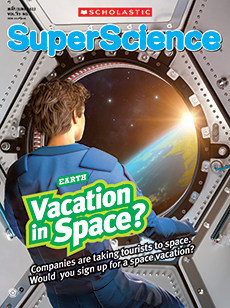Would you eat a cricket? How about a wriggly mealworm? Brent Evans, a fourth-grader in Hampshire County, West Virginia, wasn’t interested in tasting either one. But when a chef brought edible insects to his school early last year, Brent started to grow curious. This past fall, he decided to try mealworms, grasshoppers, and crickets for a social studies project.
Americans usually think of insects as pests, not food. But in other parts of the world, people have eaten bugs for thousands of years. Now some experts are urging Americans to add insects to their diets. That’s partly because bugs are nutritious. Farming insects also causes less pollution and uses fewer natural resources than farming meat like beef or pork, according to the Food and Agriculture Organization of the United Nations (U.N.).
Brent ordered roasted crickets online. When they finally arrived, he popped one into his mouth. Would he spit it out? Or would he want more?
Would you eat a cricket? How about a wriggly mealworm? Brent Evans didn’t want to taste either one. He’s a fourth-grader. He lives in Hampshire County, West Virginia. But something changed early last year. A chef brought insects to Brent’s school. They were bugs people could eat. Brent was curious. He decided to try bugs this past fall for a school project.
Americans usually think of insects as pests. But they’re food in other parts of the world. People have eaten bugs for thousands of years. Now some experts want Americans to eat them too. That’s partly because bugs are healthy. Farming insects also creates less waste than farming meat like beef or pork. And it uses fewer natural resources. That’s according to the Food and Agriculture Organization of the United Nations (U.N.).
Brent ordered roasted crickets online. They finally arrived. He popped one into his mouth. Would he spit it out? Or would he want more?
